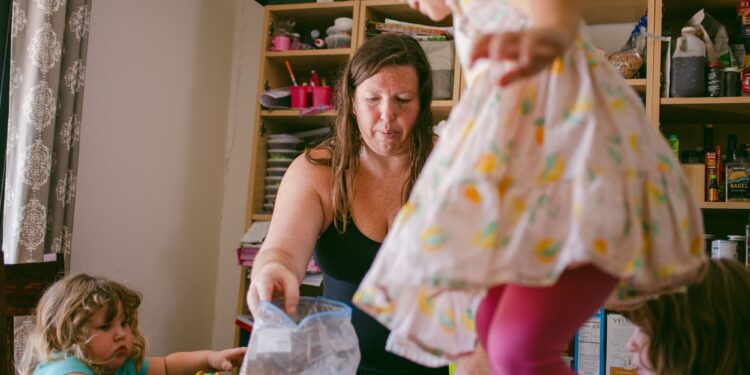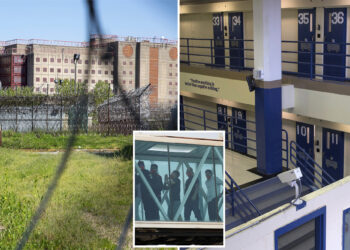Filed
6:00 a.m. EDT
04.25.2025
The reporting exposed the impact of widespread drug testing on pregnant people.
Susan Horton helps her children during playtime in their home in Cotati, California, in July 2024.
The Marshall Project has been honored as a finalist for the 2025 Goldsmith Prize for Investigative Reporting for its collaborative series revealing widespread drug testing of birthing patients in hospitals across the country and its negative consequences. This investigative work, produced in partnership with Reveal, Mother Jones and USA Today, was spearheaded by reporter Shoshana Walter, with contributions from Marianne McCune and the staff of The Marshall Project and Reveal.
The series exposed how hospitals administer unreliable drug tests to birthing patients, leading to unwarranted child welfare interventions. In many cases, mothers were reported for positive tests triggered by the medications the hospitals themselves gave them during labor. The investigation began with the story of a mother whose positive methamphetamine test was falsely triggered by a common blood pressure medication. Walter uncovered numerous other cases, including a woman who ate a poppy seed salad that resulted in a false positive opiate test and the temporary removal of her newborn. The reporting highlighted the high false-positive rates of urine screens and the consequent threats many new parents face from child welfare agencies.
Walter conducted extensive interviews with hundreds of pregnant people and birthing patients, examined medical records and filed public records requests to scrutinize drug testing and reporting practices. Her findings revealed that federal authorities have long been aware of the unreliability of urine screens, yet no state has implemented safeguards to protect birthing patients’ rights. This lack of oversight has led to traumatizing experiences for many families who were wrongfully accused and separated.
“We’re so proud of Shoshana’s reporting and the impact this work has had, and we’re grateful to the mothers who came forward to tell their stories,” said Acting Editor-in-Chief Geraldine Sealey. “Accountability journalism that makes a difference in people’s lives is more important than ever.”
Because of this investigation many affected women have come forward, and advocacy groups have mobilized for change. The stories have gained legislative attention, prompting U.S. lawmakers to condemn the practice and seek solutions. Advocacy groups are leveraging the investigation to instigate legal and policy reforms across several states. Within the medical and child welfare communities, the series has sparked discussions and initiated efforts to revise existing procedures, demonstrating the potential for systemic change prompted by rigorous investigative journalism.
Other Marshall Project reporters who contributed to this project were Weihua Li, Andrew Rodriguez Calderón, Nakylah Carter and Catherine Odom.
The Goldsmith Prize, administered by the Shorenstein Center on Media, Politics and Public Policy at Harvard Kennedy School, “honors investigative reporting that best promotes more effective and ethical conduct of government, the making of public policy, or the practice of politics.” Finalists receive $10,000, and the winner receives $25,000. This year’s winners were Katey Rusch and Casey Smith for a collaboration of The San Francisco Chronicle and the University of California Berkeley Investigative Reporting Program that exposed how California police agencies used secret legal settlements to mask officers’ misconduct. For more information about the award and to view the full list of finalists, visit GoldsmithAwards.org.























